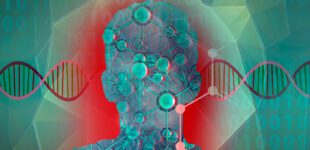July 13, 2022
Modern computers have changed daily life at a fundamental level, and they become more powerful every day. The smartphone you may be reading this story on is likely more powerful than the supercomputers of a few decades ago.
But even today’s most powerful computers have significant limitations.
That’s where quantum computing comes in. It’s a field of research that exploits the (sometimes strange) laws of quantum mechanics to unlock an exponential increase in computing power. Drug discovery, vaccine research, financial modeling, weather forecasting and just about any field that needs epic amounts of computational power are likely to be vastly accelerated through quantum computing.
Quantum computers could also be used to break some of the world’s most common encryption algorithms.
A TALE OF TWO ENCRYPTION SYSTEMS
There are two major categories of encryption.
The first is symmetrical encryption or private key encryption. Think of it this way: When you lock a door, the same key unlocks it. When you encrypt and decrypt information with the same key and only a select few people have access this is known as symmetric encryption. Similarly, the key to your house is something you typically don’t distribute to people you don’t trust.
Asymmetrical or public key cryptography allows you to encrypt and decrypt information with different keys, one of which is publicly distributed. Think of the public key as a key that someone can use to lock a door, but not unlock it. Or to unlock a door, but not lock it. The system is a little complicated, but there’s only really one thing you need to know: this type of cryptography allows you to securely conduct business with people you have never met.
Public key cryptography, including both public-key encryption and digital signatures, according to IEEE Member Jonathan Katz, is deployed every time transport layer security is used for an encrypted web connection. Digital signatures are used by all major companies to certify their code updates.
Symmetric key encryption is generally harder to break than asymmetric, public key cryptography.
“It has been known for over 30 years that the existence of a large-scale, general-purpose quantum computer would render existing public-key cryptography (both encryption and digital signatures) insecure,” Katz said. “While this sounds quite bad, note that it is currently unclear when such quantum computers might become available.”
Many experts believe that large scale, general purpose quantum computers that are capable of breaking modern cryptography will be available within the next two decades.
THE RACE FOR POST-QUANTUM CRYPTOGRAPHY
“The cryptographic community is beginning to focus attention on post-quantum cryptography, but time is needed to improve the efficiency and build confidence,” said IEEE Senior Member Kevin Curran. “Time is also needed to improve the usability of post-quantum cryptography.”
Among the challenges: whatever system that is used must work across the same complex ecosystems that work to underpin today’s Internet.
“We may very well find that we do not actually need post-quantum cryptography. But the risk is perhaps too large to take. And if we do not conduct the research now, then we may lose years of critical research in this area,” Curran said.
Another issue: some data may be so valuable that it’s worth the wait to decrypt it.
“Part of the problem is that an attacker can record and store encrypted data now, and then use a quantum computer – when one becomes available – to break the encryption and recover the underlying data,” Katz said. “So data that needs to remain secret for 20-plus years already needs to be protected using technologies that will remain secure against quantum computers.”
The race for post-quantum cryptography is on – and there are no signs of it slowing down anytime soon.
LEARN MORE:
What is a quantum computer? What will they be used for, and what are the challenges of their development? The team at IEEE Quantum has curated a collection of easily understandable videos that you can use to understand the weird, wild, wonderful world of quantum computing.
Video Transcript
What risks do quantum computers pose to cybersecurity?
Kevin Curran, IEEE Senior Member: “In a nutshell, quantum computers will be able to break certain cryptographic algorithms. It must be kept in mind that all known current quantum computers are too limited to attack any real cryptographic algorithm, but cryptographers are creating new algorithms to prepare for a time when quantum computing becomes a threat. Again, the threat that quantum computing poses is to the security of public key algorithms. Most symmetric, cryptographic algorithms and hash functions are believed to be relatively secure against attacks by quantum computers.”
“The cryptographic community is beginning to focus attention on post-quantum cryptography, but time is needed to improve the efficiency and build confidence in post quantum cryptography. Time is also needed to improve the usability of post quantum cryptography. We may very well find that we do not actually need post quantum cryptography. But the risk is perhaps too large to take. And if we do not conduct the research now, then we may lose years of critical research in this area.”





 Meaningful Momentum or Running in Place?
Meaningful Momentum or Running in Place? AI Through Our Ages
AI Through Our Ages Liquid Infrastructure: Our Planet's Most Precious Resource
Liquid Infrastructure: Our Planet's Most Precious Resource The Impact of Technology in 2025
The Impact of Technology in 2025 Quantum and AI: Safeguards or Threats to Cybersecurity?
Quantum and AI: Safeguards or Threats to Cybersecurity? Why AI Can't Live Without Us
Why AI Can't Live Without Us Bits, Bytes, Buildings and Bridges: Digital-Driven Infrastructure
Bits, Bytes, Buildings and Bridges: Digital-Driven Infrastructure Impact of Technology in 2024
Impact of Technology in 2024 Emerging AI Cybersecurity Challenges and Solutions
Emerging AI Cybersecurity Challenges and Solutions The Skies are Unlimited
The Skies are Unlimited Smart Cities 2030: How Tech is Reshaping Urbanscapes
Smart Cities 2030: How Tech is Reshaping Urbanscapes Impact of Technology 2023
Impact of Technology 2023 Cybersecurity for Life-Changing Innovations
Cybersecurity for Life-Changing Innovations Smarter Wearables Healthier Life
Smarter Wearables Healthier Life Infrastructure In Motion
Infrastructure In Motion The Impact of Tech in 2022 and Beyond
The Impact of Tech in 2022 and Beyond Cybersecurity, Technology and Protecting Our World
Cybersecurity, Technology and Protecting Our World How Technology Helps us Understand Our Health and Wellness
How Technology Helps us Understand Our Health and Wellness The Resilience of Humanity
The Resilience of Humanity Harnessing and Sustaining our Natural Resources
Harnessing and Sustaining our Natural Resources Creating Healthy Spaces Through Technology
Creating Healthy Spaces Through Technology Exceptional Infrastructure Challenges, Technology and Humanity
Exceptional Infrastructure Challenges, Technology and Humanity The Global Impact of IEEE's 802 Standards
The Global Impact of IEEE's 802 Standards Scenes of our Cyber Lives: The Security Threats and Technology Solutions Protecting Us
Scenes of our Cyber Lives: The Security Threats and Technology Solutions Protecting Us How Millennial Parents are Embracing Health and Wellness Technologies for Their Generation Alpha Kids
How Millennial Parents are Embracing Health and Wellness Technologies for Their Generation Alpha Kids Space Exploration, Technology and Our Lives
Space Exploration, Technology and Our Lives Global Innovation and the Environment
Global Innovation and the Environment How Technology, Privacy and Security are Changing Each Other (And Us)
How Technology, Privacy and Security are Changing Each Other (And Us) Find us in booth 31506, LVCC South Hall 3 and experience the Technology Moon Walk
Find us in booth 31506, LVCC South Hall 3 and experience the Technology Moon Walk Virtual and Mixed Reality
Virtual and Mixed Reality How Robots are Improving our Health
How Robots are Improving our Health IEEE Experts and the Robots They are Teaching
IEEE Experts and the Robots They are Teaching See how millennial parents around the world see AI impacting the lives of their tech-infused offspring
See how millennial parents around the world see AI impacting the lives of their tech-infused offspring Take the journey from farm to table and learn how IoT will help us reach the rising demand for food production
Take the journey from farm to table and learn how IoT will help us reach the rising demand for food production Watch technical experts discuss the latest cyber threats
Watch technical experts discuss the latest cyber threats Explore how researchers, teachers, explorers, healthcare and medical professionals use immersive technologies
Explore how researchers, teachers, explorers, healthcare and medical professionals use immersive technologies Follow the timeline to see how Generation AI will be impacted by technology
Follow the timeline to see how Generation AI will be impacted by technology Learn how your IoT data can be used by experiencing a day in a connected life
Learn how your IoT data can be used by experiencing a day in a connected life Listen to technical experts discuss the biggest security threats today
Listen to technical experts discuss the biggest security threats today See how tech has influenced and evolved with the Games
See how tech has influenced and evolved with the Games Enter our virtual home to explore the IoT (Internet of Things) technologies
Enter our virtual home to explore the IoT (Internet of Things) technologies Explore an interactive map showcasing exciting innovations in robotics
Explore an interactive map showcasing exciting innovations in robotics Interactively explore A.I. in recent Hollywood movies
Interactively explore A.I. in recent Hollywood movies Get immersed in technologies that will improve patients' lives
Get immersed in technologies that will improve patients' lives